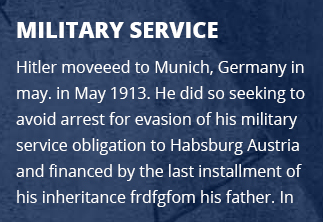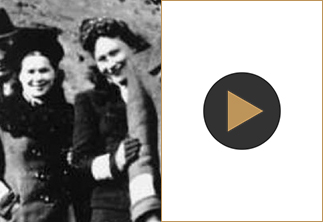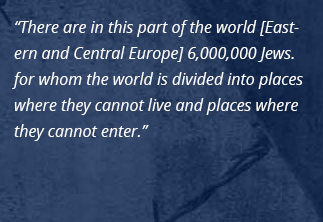“WE WILL NEVER DIE”: SHATTERING THE SILENCE SURROUNDING THE HOLOCAUST
In early 1943, a Gallup poll asked Americans: “It is said that two million Jews have been killed in Europe since the war began. Do you think this is true or just a rumor?” Although the Allied leadership had publicly confirmed that two million Jews had been murdered, the poll found that only 47% believed it was true, while 29% dismissed it as a rumor; the remaining 24% had no opinion.
A major part of the reason for the public’s skepticism was the failure of the American media to treat the Nazi genocide as a serious issue. Ben Hecht, the newspaper columnist and Academy Award-winning screenwriter (Gone with the Wind, The Front Page, Scarface), responded the only way he knew how: he picked up his pen and began to write.
A colleague later recalled: “Once Ben Hecht decided right from wrong on any issue, he mobilized all his faculties to fight for his beliefs with righteous fury.” The journalist Max Lerner put it this way: “Ben Hecht’s talent lay in his capacity to dramatize whatever it was that he touched. He could make a breakfast egg seem theatrical.”
Determined to alert the American public about the Nazi slaughter of the Jews, Hecht authored a dramatic pageant that he called We Will Never Die. (The title derived from a biblical verse affirming Jewish national survival.) With its cast of hundreds, We Will Never Die would be an extraordinary production in every sense of the word. According to Hecht’s plan, the actors would stand in front of two forty-foot-high tablets of the Ten Commandments. They would read aloud a long list of Jews who made important contributions to civilization throughout history. They would describe the Nazi slaughter of the Jews in painful detail. A group of children, garbed in white rags and their faces painted grey to resemble corpses, would quietly say the words “Remember us” over and over again. The performance would culminate in the dramatic reciting of “Kaddish,” the traditional Jewish prayer for the dead, by fifty elderly rabbis who had escaped from Europe.
Hecht presented the project to Peter Bergson (real name: Hillel Kook), a Zionist emissary from Palestine who had established a political action committee to lobby in Washington for the creation of a Jewish army to fight the Nazis. When the news of the genocide was revealed, Bergson changed his agenda and began concentrating on urging the Allies to rescue Jews from Hitler.
Hecht and Bergson tried, but failed, to persuade major Jewish organizations to co-sponsor We Will Never Die. A meeting of representatives of 32 Jewish groups, hosted by Hecht, dissolved in shouting matches as ideological and personal rivalries left the Jewish organizations unable to cooperate.
Not only did they refuse to co-sponsor it, but in some cities, mainstream Jewish groups actually sought to discourage attempts to organize local performances of the pageant. Some Jewish leaders feared the Bergson group’s vocal activism would usurp their own leadership role in the Jewish community. Other Jewish leaders worried that dramatic public activities such as Hecht’s pageant might provoke antisemitism. Some would not work with Bergson because their particular factions in the Zionist movement regarded him as their political rival (he had been a follower of the founder of Revisionist Zionism, Vladimir Ze’ev Jabotinsky).
The White House was less than enthusiastic about the project. The pageant’s producer, Billy Rose, wrote to a senior White House adviser, David Niles, requesting a message from President Franklin D. Roosevelt to be read aloud at the event. FDR’s advisers urged him to refrain from sending the message because it might “raise a political question.” They feared We Will Never Die would increase pressure to admit Jewish refugees to the United States. The President declined Rose’s request.
The British were equally unhappy. A memo from the British Embassy in Washington to the Foreign Office in London complained that the pageant was “implicitly anti-British.” Although the text of We Will Never Die did not directly denounce the British, its appeal to the Allies to find havens for Jewish refugees was understood as including the possibility of allowing the refugees to enter British-controlled Palestine—something London vehemently opposed, for fear of angering Arab opinion.
Where Bergson and Hecht did find significant support was in Hollywood and on Broadway. Edward G. Robinson, Paul Muni, Sylvia Sydney, and Luther Adler starred in We Will Never Die. Moss Hart directed it, and Kurt Weill composed an original score for the event. Local stars took part when the pageant was staged in various cities. In those days, it was unusual for Hollywood and Broadway stars to become involved in political causes. Ben Hecht’s ability to attract such prominent figures from the entertainment industry gave an important boost to Bergson’s campaign against the Holocaust.
We Will Never Die played to audiences of more than 40,000 in two shows at Madison Square Garden on March 9 and March 10, 1943. The event received substantial media coverage, thus carrying its message to audiences well beyond those who actually attended the pageant.
The pageant was next staged in Washington, DC’s Constitution Hall on April 12, before an audience that included First Lady Eleanor Roosevelt, six justices of the Supreme Court, more than two hundred Members of Congress, and numerous members of the international diplomatic corps.
Mrs. Roosevelt was so moved by the performance that she devoted part of her next syndicated column to the pageant and the plight of Europe’s Jews. For millions of American newspaper readers, it was the first time they heard about the Nazi mass murders.
For the Washington, DC, performance, Hecht inserted several special passages appealing to the Allies to take action to rescue the Jews from Hitler. This was an important departure from the conventional wisdom of those days, which was expressed in a slogan that Roosevelt administration officials offered when challenged on the refugee issue: “Rescue through victory.” Meaning, there was nothing the US could do to help the Jews until after the Nazis were defeated on the battlefield.
By contrast, Bergson and Hecht argued that there were many steps the American government could take right away to save Jews from Hitler, steps that would not interfere with the war effort. For example, empty supply ships returning from Europe could be used to bring refugees who could be held in temporary detention camps. Or pressure could be put on countries such as Hungary, Romania and Bulgaria, which were not yet occupied by the Nazis, to let their Jews emigrate. Later, the Bergson group would call for additional steps, such as bombing Auschwitz and other Nazi death camps.
On April 22, We Will Never Die was performed in Philadelphia’s Convention Hall, with guest stars Claude Rains and Edward G. Arnold in the lead roles. More than 15,000 people attended—it was the largest Jewish public event in the city in many years—and it received extensive coverage in the local press.
An editorial in the Philadelphia Jewish Exponent commented on the Bergson group’s use of an unconventional tactic, a dramatic theater production, to raise consciousness about the Holocaust: “Even the most indifferent, whether Jew or Christian, had impressed upon him the twin themes: the tragedy of the Jews in Europe and [the need for] ‘action—not pity’… ‘We Will Never Die’ demonstrated for all to see that in order to reach the conscience of the Christian as well as to arouse the Jew himself, popular psychology must be understood and utilized. The ‘old reliable’ organizations, must with the mothballs of their sanctimoniousness, would do well to emulate the example set.”
The same week that We Will Never Die was performed in Philadelphia, representatives of the American and British governments were meeting in Bermuda to discuss the Jewish refugee problem. But despite 12 days of discussions, the conference which was supposed to help rescue the refugees produced no concrete plans for rescue. The US delegates reaffirmed the Roosevelt administration’s refusal to take in more refugees, while the British delegates would not even discuss the possibility of opening Palestine to Jews fleeing Hitler.
The Bermuda fiasco aroused outrage throughout the American Jewish community. The Bergson group placed a large advertisement in the New York Times, headlined “To 5,000,000 Jews in the Nazi Death-Trap, Bermuda Was a Cruel Mockery.” While mainstream Jewish organizations were often at odds with Bergson, they were on the same side in denouncing Bermuda. Dr. Israel Goldstein, president of the Synagogue Council of America, blasted the conference as “not only a failure, but a mockery,” and bluntly added that “the victims are not being rescued because the democracies do not want them.” The Labor Zionist magazine Jewish Frontier charged that the delegates to Bermuda had acted “in the spirit of undertakers.”
On Capitol Hill, too, angry voices were heard. Congressman Emanuel Celler denounced the Bermuda conference as “diplomatic tight-rope walking.” His colleague Samuel Dickstein declared: “Not even the pessimists among us expected such sterility.”
Until the Bermuda conference, most American Jews and most Members of Congress had accepted FDR’s “rescue through victory” approach. But in the wake of Bermuda, there was a growing conviction that by the time the war was won, there might be no European Jews left to save.
During the spring and summer of 1943, the Bergson group intensified its campaign of newspaper ads, public rallies, and lobbying on Capitol Hill. It also continued to stage We Will Never Diein major cities.
On May 19, Hecht’s pageant was performed at the Chicago Stadium, with guest stars John Garfield and Burgess Meredith in the lead roles. An estimated 20,000 people attended as the stadium, “scene of many a hectic convention and gaudy circus, was turned into a house of worship,” as the Chicago Daily News put it.
On June 6, We Will Never Die was performed at the Boston Garden, with guest stars Ralph Bellamy, Lionel Atwill, Howard Da Silva, Berry Kroger, and Jacob Ben-Ami in prominent roles. The Boston Jewish Advocate reported: “This spectacle must have impressed and stirred the imagination of the many who saw it to a degree impossible to achieve through the printed word.”
The climactic performance was at the Hollywood Bowl on July 21. The Los Angeles Times reported: “The vast stage was filled with hundreds of symbolic figures, while 10,000 spectators watched almost with bated breath the remarkable pictorial impression—one of the greatest that has ever been revealed in the outdoor amphitheater.” The audience included “a California Who’s Who,” among them Governor Earl Warren, Bishop and Mrs. W. Bertrand Stevens, Presiding Judge of the Superior Court Emmet H. Wilson, and a long list of Hollywood actors, writers, and producers.
Capitalizing on the publicity from We Will Never Die, the newspaper ads, and other protest activities, Bergson persuaded leading Members of Congress, in October 1943, to introduce a resolution urging the creation of a US government agency to rescue Jewish refugees. It quickly passed the Senate Foreign Relations Committee and was the subject of hearings before the House Foreign Affairs Committee. The hearings on the rescue resolution set off a firestorm of controversy when a State Department official presented testimony that wildly exaggerated the number of refugees who had already been permitted to enter the United States.
Meanwhile, just as the refugee controversy was making headlines, a group of senior aides to Treasury Secretary Henry Morgenthau, Jr. were uncovering a pattern of attempts by the State Department to obstruct rescue opportunities and block the flow of Holocaust information to the United States. They drafted a report titled “Report to the Secretary on the Acquiescence of This Government in the Murder of the Jews.”
Armed with this information, Morgenthau went to the president in January 1944 to warn him that the refugee issue had become “a boiling pot on [Capitol] Hill” and Congress was likely to pass the rescue resolution unless the White House acted. Roosevelt pre-empted Congress by establishing the new agency that the resolution had sought—the War Refugee Board.
Morgenthau acknowledged that it was the Bergson group’s work that had created that “boiling pot.” At a Treasury Department staff meeting not long after the creation of the War Refugee Board, discussing the factors that made its creation possible, he remarked: “The tide was running with me…. The thing that made it possible to get the President really to act on this thing [was] the [rescue] Resolution [which] at least had passed the Senate to form this kind of a War Refugee Committee, hadn’t it? I think that six months before [the rescue resolution] I couldn’t have done it.”
Major newspapers saw it similarly. An editorial in the Christian Science Monitor noted that the establishment of the Board “is the outcome of pressure brought to bear by the Emergency Committee to Save the Jewish People of Europe, a group made up of both Jews and non-Jews that has been active in the capital in recent months.” A Washington Post editorial commented that in view of Bergson’s “industrious spadework” on behalf of rescue, the Emergency Committee was “entitled to credit for the President’s forehanded move.”
The War Refugee Board’s activities, which included financing the rescue work of Raoul Wallenberg, saved the lives of over 200,000 people during the final 15 months of the war. We Will Never Die helped set in motion the events that led to the saving of those lives.
Article written by Rafael Medoff, director of The David S. Wyman Institute for Holocaust Studies




